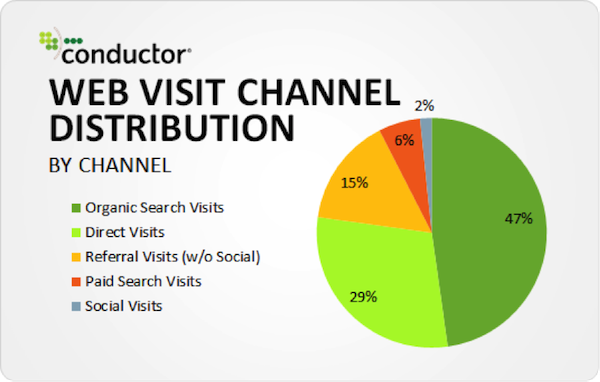Knowing exactly how your customers are finding you online is a key part of any successful online marketing strategy. But is simply viewing your Google Analytics and taking the data at face value enough?
Groupon didn’t seem to think so. That’s why Groupon de-indexed their site for nearly 6 hours this month. What Groupon wanted to determine was how much of their so-called “direct” traffic was actually organic search traffic. The result? They discovered 60 percent of their direct traffic was actually organic search.
This experiment inspired Conductor to update an earlier study of 310 million visits. Here’s a look at what Conductor discovered.
Initial Findings: Organic Search = 47% of Visits
In this study, Conductor analyzed the data from 30 websites in six different industries. The data covered one year and included over 310 million visits to the websites. Prior to Groupon’s experiment, Conductor’s study found that organic search was responsible for 47% of all visits. Additionally, 29 percent of visits were attributed to direct traffic. But that was all about to change.

Playing With the Numbers
Conductor took a note from Groupon and decided to take 60 percent of the traffic originally attributed to direct search and reallocated it to organic visits. This brought up the initial percentage of organic traffic up from 47 percent to 64 percent. In turn, direct traffic dropped from 29 percent to 12 percent.
This is a quite significant shift in percentages.

Digital marketers should rely heavily on this information when building and adjusting their online strategy. If this study tells us anything, it’s how important quality, organic search traffic really is.
Here are three simple tips for improving your organic search traffic:
- Create Quality Content: No doubt you’ve heard this countless times, but that’s because everything starts with good content. Write content that your customers want to read and that answers their questions. Then do your due diligence to promote the content effectively.
- Optimize Your Content: To make your content more searchable, be sure to use appropriate meta titles, descriptions, and keywords in your web content.
- Play Nice with Search Engines: We can complain all day long about how Google’s constant search changes have affected our site traffic. Fact of the matter is, we have to follow the guidelines set forth by search engines. If we don’t, there can be serious consequences.
Put Your Website to the Test
Login to your analytics and take a look at your search traffic from the past year. If you were to remove 60 percent of your direct traffic and add it to your organic traffic, what would be your results? Based on these results, how would it affect your online marketing strategy? Let us know in the comments.

This Year’s Premier Digital Marketing Event is #CZLSF
ClickZ Live San Francisco (Aug 11-14) will bring together the industry’s leading online marketing practitioners to deliver 4 days of educational sessions and training workshops. From Data-Driven Marketing to Social, Mobile, Display, Search and Email, the comprehensive agenda will help you maximize your marketing efforts and ROI. Early Bird Rates available through Friday, July 18. Register & save!

